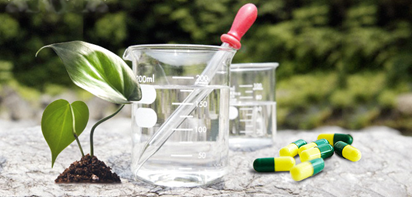Introduction
Agriculture chemistry is the study of agricultural production, as well as the interaction of plants, bacteria, animals, and their environment. It is a scientific field that studies the composition of both chemistry and biochemistry. We study the production of food, Agri products, and beverages from raw materials in agriculture chemistry. Herbicides, growth regulators, fertilisers, insecticides, and pesticides are examples of agricultural materials. Agricultural chemistry seeks to increase agricultural yield, improve soil quality and fertility, and increase crop yield.
What is Agricultural Chemistry
Agriculture is the process of raising livestock, crops, and other food products. Agriculture in the modern era includes horticulture, agronomy, dairying, soil chemistry, animal husbandry, and so on. Organic, inorganic, and agricultural products are all studied in chemistry. Agricultural chemistry is the application of both agriculture and chemistry that deals with crop production and improvement. Photosynthesis, fertilisers, pesticides and insecticides, irrigation, agricultural produce storage, food processing, chemicals etc.

Why Agricultural Chemistry is important?
Chemistry plays a significant role in crop and livestock production, controlling pathogens, insects, and weeds, and improving crop yield. The world’s population is growing by the day. To meet the growing population’s demand, agricultural chemistry not only improves crop production resources but also uses crops and crop waste to produce renewable fuel and feedstocks. We know that plants produce food through the process of photosynthesis. It is a natural phenomenon, but we can learn about the mechanism involved in the photosynthesis process thanks to agricultural chemistry. This aided us in increasing crop production.
- Agriculture chemistry contributes to soil quality improvement by testing soil and nutrients.
- Fertilisers are organic and inorganic compounds that can be found naturally or synthetically. They are applied to the soil during agriculture to increase crop yield. Fertilisers are applied to the soil to provide the macro and micronutrients required for crop production.
- Pesticides and insecticides are chemicals that are used in crop production to reduce damage caused by insects and pests.
- Agriculture chemistry aids in the storage of food products, such as sulphur dioxide, which is used to keep grains fresh for long-term storage. Salicylic acid and sodium benzoate are used in food preservation and shelf life extension.
- Modern agricultural chemistry is now using crop and food waste to produce renewable energy fuels and beverages. Examples include the production of alcohol from bagasse and the use of the Jatropha plant in the production of fuel.
| Type of Material | Products |
| Food | Refined oil, Butter, cheese, etc. |
| Petroleum | Kerosene, Diesel, Petrol, etc |
| Construction | Mortar, glass, chemicals, and chemical compounds. |
| Household | Cooking gas, food process. |
What is the purpose of Agricultural Chemistry?
Agricultural Chemistry’s goal is to increase crop production by using pesticides, fungicides, fertilisers, and other chemicals. In modern chemistry, Crops and other crop wastes are used in the production of biofuels and beverages.
- As agriculture advances, chemistry improves irrigation techniques through the use of plastic pipes, drip irrigation techniques, sprinkler systems, and so on. Crop production has increased as a result of improved irrigation and a favourable climate.
- It has invented preservatives such as salicylic acid and sodium benzoates, as well as other chemicals, to extend the shelf life of food products.
- Agricultural chemistry applied science improves crop quality and yield and lowers production costs.
- A subfield of agricultural chemistry Chemurgy is working on utilising agricultural products as raw materials for subsequent production such as oil production, petroleum, cooking gas, and so on.
Summary
We learned that agricultural chemistry is a branch of science that deals with the intersection of chemistry and agriculture production. It aids in the production of agricultural products as well as the processing of food and beverages from raw materials. It establishes the relationship between the environment, microbes, plants, and animals. Furthermore, it aids in increasing the quantity and quality of food. Agriculture chemistry incorporates not only chemistry and agriculture, but also microbiology, genetics, physiology, entomology, ecology, and so on.
Frequently Asked Questions
1. Organic fertilisers: what are they?
Ans. Animal manure, fruit and vegetable compost, and fish are examples of living systems from which organic fertilisers are derived. The soil’s microbial population breaks down organic waste. It is rich in potassium, nitrogen, phosphorus, calcium, etc.
2. Inorganic fertilisers: What are they?
Ans. Minerals and synthetic chemicals are used to make inorganic fertiliser, which is synthetic. Petroleum is frequently used to produce inorganic nitrogen.
3. What do you mean by Insecticides and Pesticides?
Ans. Chemicals called pesticides are used to protect crops from things like fungi, weeds, and pests. Chemicals called insecticides are used to eradicate insects that are harmful to crops or livestock.
 Mission Statement
Mission Statement
“Empower every student to achieve full potential”
88Guru has been established with the social objective of making quality video-based learning material available to all Indian students. Technology, Connectivity and Social Media are rapidly changing the world of Education and we wish to lead the transformation of the tuition industry in India.
88Guru is the perfect complement to the current tuition model. 88Guru creates a wonderful opportunity for children and parents to bond while engaging in a valuable learning activity. It also provides the complete curriculum at your fingertips for those moments when you need some help at short notice. We believe that this mode of tuition could be transformational, adding hours to a child's day while providing complete control over the learning process.
Every course is taught by the best teachers from India's top schools and conducted in an engaging manner to keep students involved. The e-learning process consists of video-based instructions, computer-graded assignments, and a dashboard which allows the student and parent to track progress.


